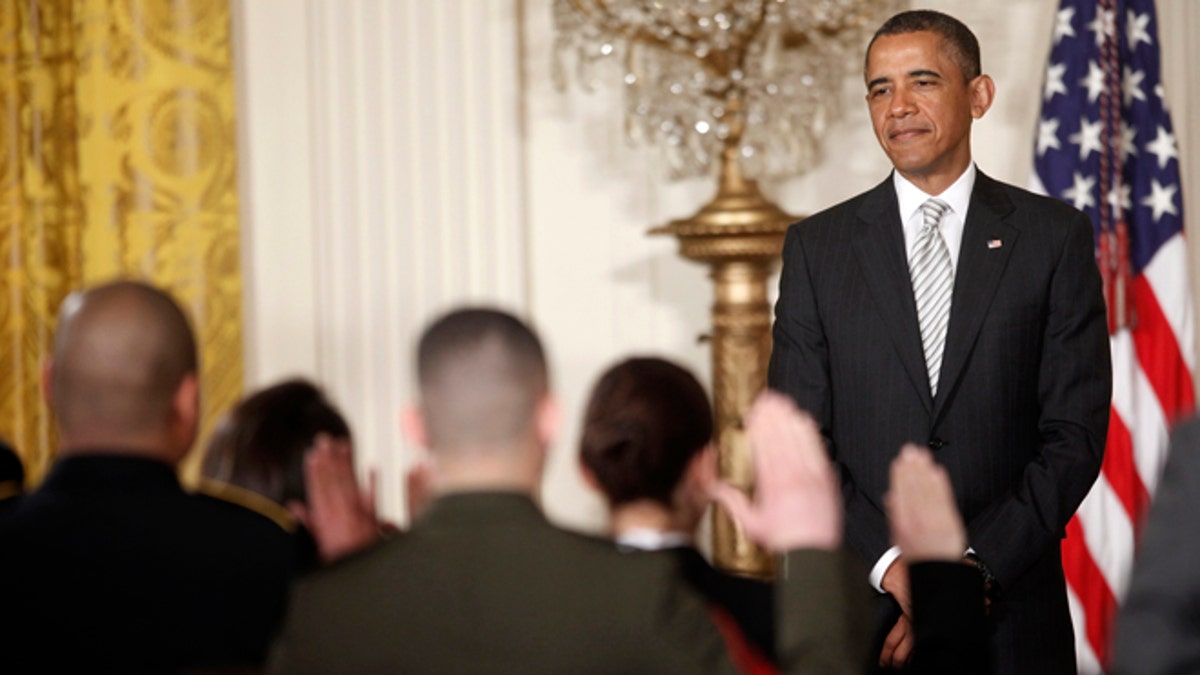
President Barack Obama, watches as the Oath of Allegiance is administered at a naturalization ceremony for active duty service members and civilians, Monday, March 25, 2013, in the East Room of the White House in Washington. (AP)
For 28 immigrants, the path to citizenship led to the White House Monday.
The immigrants became U.S. citizens at a ceremony where President Obama reaffirmed his commitment to reforming the country’s flawed immigration system.
With members of the House and Senate away on spring break, Obama made his most substantive remarks on the difficult issue in more than a month, saying he expects lawmakers to produce legislation quickly and that he hopes to sign into law as soon as possible.
The 28 immigrants hailed from more than two dozen countries, including Afghanistan, China, Ethiopia, Mexico, Germany, Ukraine, and Peru. Thirteen were members of the U.S. military. Between 2002 and 2012, immigration officials naturalized nearly 83,000 members of the military.
Obama told the immigrants that their new status as citizens reflected a loyalty to their adopted homeland.
“This is an incredibly special moment for you and your families, but I have to say, it’s a special moment for the rest of us as well,” Obama said. “Because as we look out across this room, we’re reminded that what makes somebody American isn’t just their bloodlines, it’s not just an accident of birth. It’s a fidelity to our founding principles, a faith in the idea that anyone, anywhere, can write the next great chapter in this American story."
The president seized on the celebratory spirit of naturalization to frame immigration as a positive force for the country, and to press for a reform measure that would tighten security as well as provide an opportunity for certain undocumented immigrants to legalize their status.
“Immigration makes us a stronger,” he said. “If we want to keep attracting the best and the brightest that the world has to offer, then we need to do a better job of welcoming them.”
A critical step to attracting immigrants who will help bolster the country, he said, is to fix the flaws in the immigration system.
“We’re not doing enough to harness the talent and ingenuity of all those who want to work hard and find a place here in America,” he said. “And after avoiding the problem for years, the time has come to fix it once and for all. The time has come for a comprehensive, sensible immigration reform.”
A bipartisan group of eight senators is close to finishing draft work on a bill that would dramatically reshape the U.S. immigration and employment landscape, putting 11 million undocumented immigrants on a path to citizenship. The measure also would allow tens of thousands of new high- and low-skilled workers into the country.
The president applauded the congressional effort so far, but pressed lawmakers to wrap up their discussions quickly.
"We've got a lot of white papers and studies," Obama said. "We've just got to, at this point, work up the political courage to do what's required."
Immigration shot to the forefront of Obama's domestic agenda following the November election. Hispanics made up 10 percent of the electorate and overwhelmingly backed Obama, in part because of the tough stance on immigration that Republicans took during the campaign.
The election results spurred Republicans to tackle immigration reform for the first time since 2007 in an effort to increase the party's appeal to Hispanics and keep the GOP competitive in national elections.
Obama and the bipartisan Senate group are in lockstep on the key principles of a potential immigration bill, including a pathway to citizenship, strengthening the legal immigration system, and cracking down on businesses that employ undocumented immigrants. The White House has largely backed the Senate process, but says it has its own immigration bill ready if the debate on Capitol Hill stalls.
Meanwhile, a political group called Organizing for Action, which sprung from Obama’s campaign machinery, plans an ambitious social media push for immigration reform that will seek to put a human face on complex aspects of the immigration issue, according to The New York Times.
The United States naturalizes nearly 700,000 immigrants each year inside the country and around the world. In 2011, the top countries of origin for naturalization were, respectively, Mexico, India, Philippines, China, and Colombia.
The Associated Press contributed to this story.
Follow us on twitter.com/foxnewslatino
Like us at facebook.com/foxnewslatino




